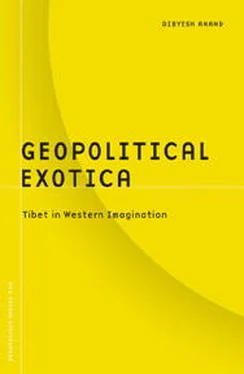The mask of objectivity in the colonial discourse hid relations of inequality and domination. Fiction as well as nonfiction writings were permeated with various strategies of representation. These were not epiphenomenal but central to the ways in which the Other was sought to be known. What Kabbani points out about travel writing holds true for nonfictional writings in general: during imperialism, it ultimately produced "a communal image of the East," which "sustained a political structure and was sustained by it" (1986, 10).
Various forms of representing the non-West-visual (films, television, photographs, paintings, advertisements, and so on) as well as textual (such as fiction, travelogue, journalism, ethnography, and anthropology)-were closely linked to the production of imperial encounters. Asymmetry of productive power is a common trait shared by these encounters. The contemporary neocolonial world too "bears witness to the unequal and uneven forces of cultural representation involved in the contest for political and social within the modern world order" (Bhabha 1994, 171). It is not only the represented (here the colonized, the third world, the South) who are subjects of and subjected to the process; even the representer (the colonizer, the first world, the West) is constructed by representational practices. This in no way implies similar experiences for the colonizer and the colonized (the representer and the represented). It only indicates that though everyone is subjected to representational practices, the impact differs according to the existing power relations. To illustrate this point, while both the West and Tibetans are subjects of Exotica Tibet, and the latter are not mere victims but exercise their agency through creative negotiations, the West does not have to construct its identity according to the perception of Tibetans. Westerners exoticize Tibet, and in turn, Tibetans exoticize the West. But while Western exoticization has a defining productive impact on Tibetan identity discourse (as discussed in detail in chapters 5 and 6), the same cannot be said of Tibetan exoticization of the West. This reflects the asymmetry in their power relations.
A concentration on Western representations does not deny the fact that representational practices were prevalent in non-Western societies too. In fact, historically all cultures and civilizations have had their own particular representational practices for perceiving those they considered as Other. But-and this is a crucial qualification-it was only with modern European imperialism that the capacity to convert these representations into truth on a systematic and mass scale emerged. What makes such representational practices distinctly modern is their productive capacity. Production of knowledge about the Other through representations goes hand in hand with the construction, articulation, and affirmation of differences between the Self and Other, which in turn feed into the identity politics among the representer as well as the represented.
ESSENTIALIZING AND STEREOTYPING THE OTHER
The practices of essentializing and stereotyping the Other underlie different strategies of Western representations. Essentialism is the notion that some core meaning or identity is determinate and not subject to interpretation. Inden writes that essentialist ways of seeing tend to ignore the "intricacies of agency" pertinent to the flux and development of any social system (1990, 20). In the colonial context, we find essentialism in the reduction of the indigenous people to an "essential" idea of what it means to be "native"-say, Africans as singing-dancing-fighting, Chinese as duplicitous, Arabs as cruel and oppressors of women, Tibetans as religious, and so on. Imperialism drew its strength from representations of natives as quintessentially lazy, ignorant, deceitful, passive, incapable of self-governing, and the native rulers as corrupt and despotic. Therefore, it should come as no surprise that the British officials involved during the 1903-4 invasion of Tibet saw it as something welcomed by "ordinary" Tibetans seeking deliverance from their Chinese and monastic overlords. Captain Cecil Rawling in a military report in 1905 wrote: "It seems to be the general wish of the inhabitants of that country (Tibet) that they should come under British administration" (in Lamb i960, 296). Curiously, Lamb's own assessment that "when dealing with the primitive peoples of Central Asia, the problem often was not how to expand one's power but how to prevent its indefinite expansion" (101; emphasis added) also puts the onus of responsibility for imperial expansion on the victims themselves. This is made possible by their essentialist representations as requiring paternal imperialism-an alternation of iron fist and velvet glove.
A stereotype is a one-sided description of a group/culture resulting from the collapsing of complex differences into a simple "cardboard cut-out," seeing people as a preset image and "more of a formula than a human being" (Gross 1966, 2). It reduces people to a few, simple characteristics, which are then represented as fixed by nature. "Stereotyping reduces, essentialises, naturalises and fixes 'difference'" (Hall 1997a, 257-58). Stereotypes function as a marker between norm and deviancy (see Gilman 1985), between "us" and "them." As Said argues, stereotypical images of the Orient's separateness-"its eccentricity, its backwardness, its silent indifference, its feminine penetrability, its supine malleability"-have been part of Western discursive practices for a long time (1978, 4). Such images flourished to justify imperialism as a civilizing mission-the restless, honest, active, exploratory, masculine, enlightened, modern spirit of the "white man" stood in contrast to the laziness, deceit, passivity, fatalism, femininity, backwardness, and traditional spiritlessness of the natives. For example, Captain John Noel's films Climbing Mount Everest (1922) and The Epic of Everest (1924) developed the "contrast between the extroverted, aggressive, and manly British climbers with the introverted, passive, and squalid but mystical Tibetans" (Hansen 2001, 92-93).
Stereotyping is a simplification because it freezes what is otherwise a fluid, contested, complex always-in-motion identity. Let me illustrate this with an example from the story of the first two men to reach Mount Everest-Tenzing Norgay and Edmund Hillary. Reaching the summit, Tenzing Norgay says he felt the warm presence of the mountain, buried an offering to the gods, and said in prayer: "I am grateful, Chomolungma" (in Hansen 1998); Hillary took photographs to survey the area, urinated on the summit, and later told one of the other climbers, George Lowe: "Well, George, we knocked the bastard off" (Outside Online 1999). This difference in attitude may be due to cultural factors. But to interpret humility as passivity and fix the identity of Tenzing Norgay (read as representative of Sherpas and other natives) as essentially passive in contrast to adventurous, scientific Hillary (read as white man) leads to a reified and fixated form of representation (excluding those who do not "fit" in the image-women, for instance). Stereotyping is not about expressing cultural difference but fixing it in a pregiven sociocultural milieu with extreme power differentials.
Stereotyping served imperialism at both representational and psychic levels-supporting the idea of paternal domination and acting as a kind of perceptual blinder protecting the colonizers from the discomforting consciousness of either poverty or guilt (Lebow 1976, 22). It allowed the participants in the massacre of Tibetans at Guru (31 March 1904) that took place during the British invasion of Tibet to blame it on the "crass stupidity and childishness of the Tibetan general" (Mehra 1979, 223), malevolent "thorough-going obstructionist" (IOR: MSS EUR/F197/105 n.d., 6) monks, superstitious Tibetan soldiers-everyone except themselves. We must liberate the ordinary natives from their brutal leaders-this sentiment can be seen in Colonel Francis Younghusband's account of the 1903-4 expedition to Tibet where, after criticizing Tibetans for being crafty, immoral, overreligious, dirty, and lazy, he talks about the role of the British in providing enlightened guidance to ordinary Tibetans (Younghusband 1910, 321). Younghusband argued for a permanent settlement at the end of the invasion "which would prevent the Lhasa Lamas from ever again usurping monopoly of power to the detriment of British interests and to the ruin of their own country" (IOR: MSS EUR/F197/106 n.d., 2).
Читать дальше












